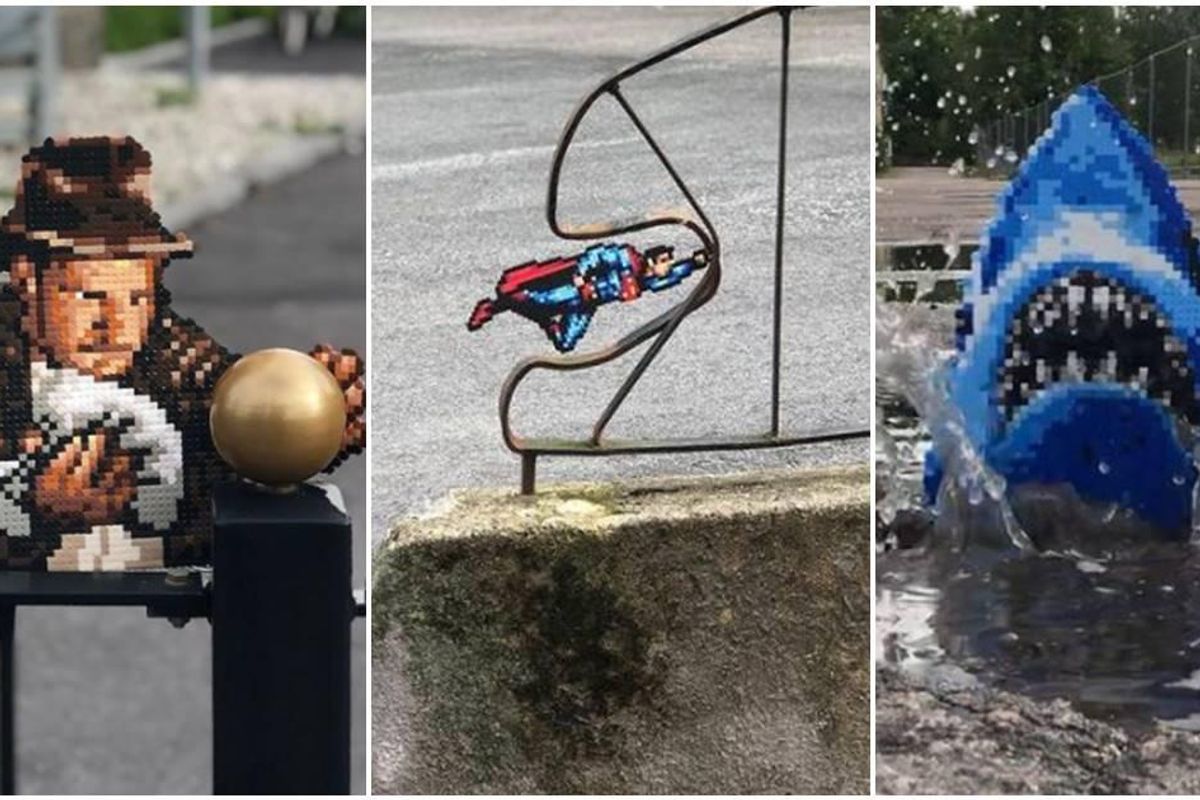Artist makes everyday spaces magical by cleverly adding pixelated, old-school pop-culture icons
Here are 17 of his most clever pieces.

Pappas Pärlor's fantastic street art.
Anyone who grew up in the late '80s and early '90s—Gen X, I’m looking at you—grew up in a world that was dominated by 8-bit graphics. Back in the day, computers and video game systems had a limited amount of processing power so the graphics had to be simple.
That meant the heroes that we played with such as Mario from Super Mario Brothers or Link from The Legend of Zelda, had to be super simple looking and we had to fill in the rest with our imaginations.
Video graphics have come a long way over the past 30-plus years, but people still love the old designs because it takes them back to a simpler time. This has led to an 8-bit movement where people use their creativity to make art within the confines of the limited medium.
Some people also use the limited 8-bit soundscape to create music that’s reminiscent of the old games. Sure, computer game music may be much more sophisticated these days, but is there anything better than the original Tetris soundtrack? Would Super Mario Brothers be the same with a sophisticated soundtrack? I think not.
Swedish artist Johan Karlgren, who goes by the name Pappas Pärlor, creates pixelated 8-bit-looking art and then inserts it into everyday scenes. The interesting thing is that his 8-bit art isn’t done with computer graphics, but Perler beads.
Perler beads are small, plastic beads that one places on a grid, and when the picture is done, they are melted with a household clothing iron. The beads are a fun hobby for kids who love to see the melting beads ooze their way into a fully-formed picture.
Although they weren’t originally intended to make 8-bit art, because the beads are placed on a grid when they melt together the designs look like they came straight out of a Nintendo Entertainment System.
Super Mario 3 Tanooki Suit Perler Beads Timelapsepic.twitter.com/Ywed4B3y47— Soma \ud83d\udc9c\ud83c\udf19 | AlleyCat \ud83d\ude38\ud83d\udc08\u200d\u2b1b (@Soma \ud83d\udc9c\ud83c\udf19 | AlleyCat \ud83d\ude38\ud83d\udc08\u200d\u2b1b) 1584560959
Karlgren recreates iconic images from comics, cartoons, video games, and movies with the beads and then adds them to the scenarios, turning the mundane into the whimsical.
What’s Karlgren’s big inspiration? “Anything that makes me feel something,” he told Bored Panda. “It could be anything from childhood memories to politics or people doing awesome stuff that I wanna interpret.”
For Karlgren, his work is the byproduct of having a good time. “I don’t really choose what to create. My work is sprung from playing, and I’ll try to go with the ideas that come up in my head,” he said.
One of the hallmarks of Karlgen’s work is taking drab places such as a parking lot or other types of urban infrastructure and livening them up with the addition of one of his Perler bead creations. "It's something that makes me happy, and hopefully other people [when] seeing it as well," he told Newsweek.
Karlgren is a father of four and started posting his creations on Instagram back in April 2014. Since then, his fun, old-school designs have earned him more than 144,000 followers. Here are some of his coolest, and funniest 8-bit designs.

